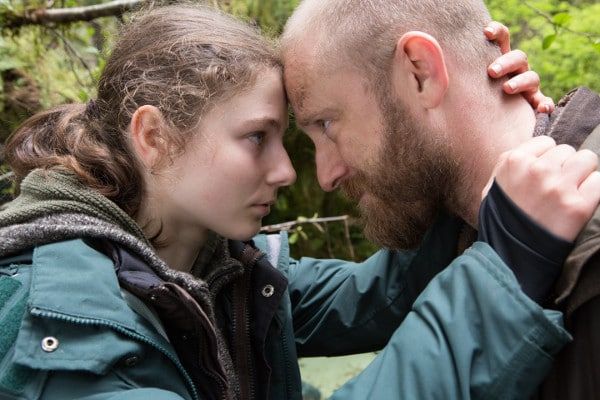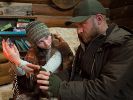Eye For Film >> Movies >> Leave No Trace (2018) Film Review
Leave No Trace
Reviewed by: Owen Van Spall

Winter’s Bone director Debra Granik returns to feature films with another look at American outsiders operating either on the fringes or outside the modern, interconnected world. Leave No Trace is, like Bone, a small-scale, atmospheric character-driven piece with a young woman at the centre that explores issues of family bonds, parental responsibility, and the challenges faced in a life with minimal resources. It features strong performances from lead Ben Foster and newcomer Thomasin Harcourt McKenzie as a father-daughter pair - Will and Tom - who are living off the grid in a vast nature reserve on the edge of Portland, Oregon.
We are introduced to them in the middle of what must be one of any number of typical daily routines getting their tent camp ready for sunup: pack the tools away into a hidden crevice, check the water supply that has gathered overnight, start cooking breakfast without resorting to the limited propane supplies. There is no onscreen text or narration, so we are inclined to lean in to guess how they ended up here and what Will’s deal is.

Will is a quiet, calm presence, but his intensity and insistence on teaching Tom escape and evade techniques seems a little odd. He also is very interrogative towards Tom whenever she reveals she came close to the presence of any outsider, or reveals a slip-up in their routine. The expectation is that when the outer world, which Will seems to keen to avoid, finally intrudes, we will learn more about what made this man want to live like this. Granik’s film, which she co-wrote with Anne Rosellini, adapting from the novel by Peter Rock, delivers on that expectation. But instead of screen-filling emotional fireworks, turning into an escape drama, or devolving into a straight-up celebration of the nomadic lifestyle, she instead chooses as much to sympathetically and quietly interrogate Will as a father as she does to explore how someone could find modern American life unbearable. How does a person fall between the cracks?
One thing I particularly enjoyed was that it balances its study of Will with an exploration of Tom’s coming of age, while never making Will’s decision to drop out morally clear-cut, even as it shows how difficult it is in the modern world to live without the accoutrements that a ‘connected’ person picks up. Bureaucracy and technology have a way of sticking to a person like flypaper. Thus when a chance encounter with a jogger blows their cover, and authorities alerted to the presence of illegal camping in the park take Will and Tom to first the police, and later social services, Will quickly finds the paperwork, web-ready devices, and various legal requirements stacking up.
Clearly these were things he wanted to avoid. But it is also noticeable that the law enforcement and social service workers Will and Tom meet are never cruel, even if they are inquisitive and have a battery of psych test questions that want to ask Will, hundreds in fact. The look on Foster’s face as he faces a blandly-voiced computer for the testing tells it all; this is not a man who likes to look inside his own head. And the reason for that soon becomes clear, as it is revealed Will is a special forces veteran, presumably from Afghanistan or Iraq. A kindly female social service officer who quizzes Tom also has a pertinent question to further complicate Will’s choice to flee human contact: is it fair on his teen daughter, who has been denied socialisation? Though she notes Tom is above the expected level on reading and maths, she points out to the anxious girl that schooling isn’t just about being able to write and add.
The revelation about Will’s past not only raises the issue of his almost certainly suffering from PTSD, but connects the film to the current ongoing controversy over not only the US involvement in recent morally questionable and very lengthy wars, but the failures of the notoriously incompetent Veterans Affairs bureau. Armed Forces dropouts are a shamefully common phenomenon in the US, and Will is not the only one to appear in the film. Pointedly, a trip to a VA station by the pair to try to shift some medication that Will finds useless sees Tom get a sales talk from a vet stall manager which includes a pitch for a suicide prevention clamp for a rifle. A chilling thought. Yet the film, whilst presenting Will sympathetically in this way (and Foster’s character doesn’t present in what you night consider a typical ‘wreck’ fashion, with no shouting or screaming or violence), never loses sight of the warning that the social services officer gave to Tom: that girls deserve the choice of an education that is about more than just survival skills.
This clearly resonates with Tom, and the fraying of her relationship with her Dad after this interruption of the ‘real world’ is well-drawn and believable, whether it is Tom clearly being drawn to boys her age after she starts to encounter them in one of the care homes they are placed in, or awakening to how the truisms her Dad drops on her ("Those were never our things," Will declares about one of the rest homes social services put them in) are in fact based on his decisions, not hers. Some of the decisions Will makes eventually become physically exhausting for the young girl, and even life threatening. Tom is old enough to reason that even if the modern world had its banalities and pressures, and plenty of moral compromises, it has things like advanced healthcare. Even if the path this sets these characters on, where each has to choose where they draw the line at what amount of independence is enough is perhaps predictable, it is very well-handled.
Reviewed on: 02 Jun 2018
















